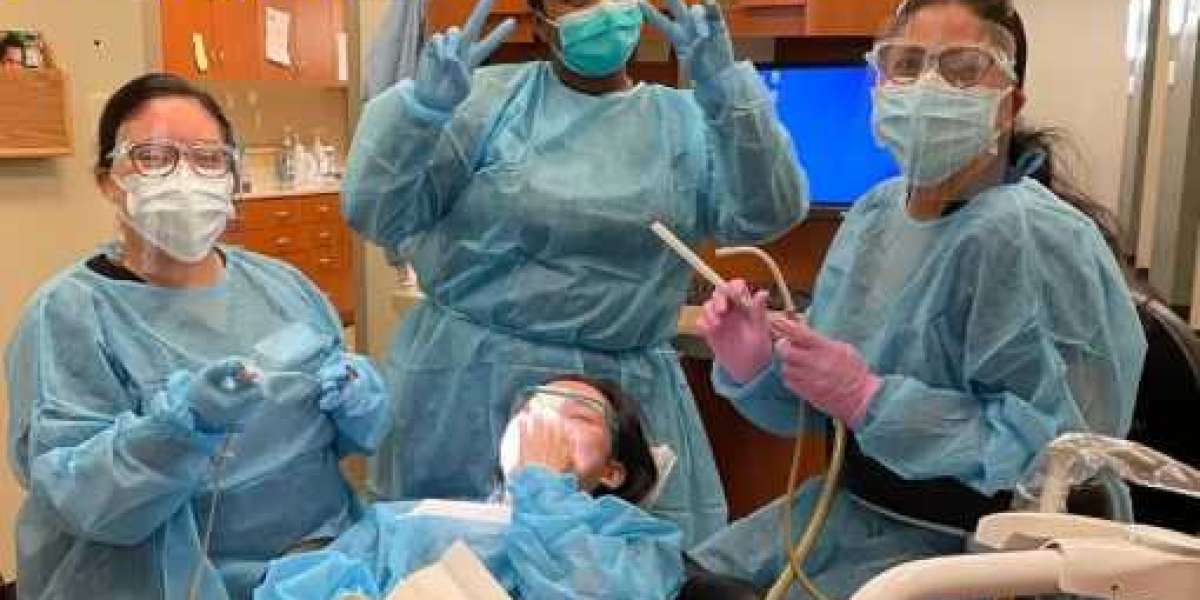Assisting 101 is a dental assisting program that was started with the help of experienced dental professionals, including dentists, dental hygienists, and dental assistants.
Our program was designed to teach the practical skills and knowledge necessary for success in the day-to-day aspects of dental assisting. Our goal is to provide a fun, informative, hands-on, and affordable education to our students.
Our team is dedicated to helping each student reach their full potential and we are committed to going above and beyond to help them achieve their goals.
At Assisting 101, our philosophy is simple: Our success is measured by the success of our students. So, we work tirelessly to help our students be the best they can be.
Dental Assisting: Enhancing Smiles and Dental Care
Dental Assisting is a vital component of the modern dental care system, playing a crucial role in maintaining oral health and promoting smiles. As an essential member of the dental team, a dental assistant assists dentists in various procedures, ensures smooth clinic operations, and provides compassionate care to patients. This profession offers a rewarding career path that combines technical skills, empathy, and a passion for improving people's oral health. In this article, we will explore the responsibilities, qualifications, and significance of dental assisting, as well as the growing demand for dental assistants and the potential career opportunities in this field.
The Role of Dental Assistants:
Dental assistants work side by side with dentists, dental hygienists, and other members of the dental team to support patient care. Their responsibilities encompass a wide range of tasks that include preparing treatment rooms, sterilizing dental instruments, taking and developing X-rays, maintaining patient records, and educating patients on proper oral hygiene techniques. Dental assistants also play a crucial role in assisting during dental procedures, passing instruments to the dentist, and ensuring patient comfort.
Qualifications and Education:
To become a dental assistant, one typically requires a high school diploma or equivalent. While some assistants may gain practical experience on the job, many pursue formal education through accredited dental assisting programs offered by community colleges, technical schools, or vocational institutes. These programs provide comprehensive training in dental anatomy, radiography, infection control, dental materials, and chairside assistance.
Additionally, many states and countries require dental assistants to obtain licensure or certification to practice legally. The Dental Assisting National Board (DANB) in the United States offers the Certified Dental Assistant (CDA) credential, which is widely recognized and indicates a dental assistant's competence and expertise. Earning a certification demonstrates a commitment to professionalism and can lead to better job prospects and higher earning potential.
Significance in Dental Practice:
Dental assistants are the backbone of any well-functioning dental practice. Their efficient and organized support allows dentists to focus on diagnosing and treating oral health issues while ensuring a seamless patient experience. By preparing treatment rooms and sterilizing equipment, dental assistants play a crucial role in maintaining a sterile and safe environment for patients and the dental team.
Moreover, dental assistants often act as a comforting presence for patients, addressing their concerns and anxieties, and offering reassurance during procedures. Building a rapport with patients is essential to promote regular dental visits and maintain good oral health practices.
The Growing Demand for Dental Assistants:
The demand for dental assistants is on the rise, driven by several factors. Firstly, as the population grows and ages, there is a greater need for oral health care services. Additionally, an increased focus on preventive dental care has led to more frequent dental visits and a greater demand for skilled dental assistants.
Furthermore, the expansion of dental practices and dental clinics has created new job opportunities for dental assistants. Many dentists recognize the value of dental assistants in enhancing the efficiency of their practices, allowing them to see more patients and provide better care.
Career Opportunities and Advancement:
A career in dental assisting can lead to various exciting opportunities and avenues for growth. Some dental assistants may choose to specialize in specific areas of dentistry, such as orthodontics, pediatric dentistry, or oral surgery. Specialization often requires additional training and experience but can lead to higher earning potential and more specialized job roles.
Moreover, with experience and further education, dental assistants can pursue careers as dental office managers, dental product sales representatives, or educators in dental assisting programs. These career paths offer a chance to take on leadership roles and make a broader impact in the dental community.
Conclusion:
Dental assisting is a fulfilling and dynamic profession that combines technical skills, compassion, and dedication to improving oral health. As an integral part of the dental team, dental assistants contribute to creating brighter smiles and healthier lives for patients. With a growing demand for dental services and an expanding range of opportunities, a career in dental assisting holds tremendous potential for those interested in making a positive impact on the world of oral health care. Whether starting a new career or considering a transition, dental assisting offers a path that will leave you with a lasting sense of accomplishment and satisfaction. Read More







